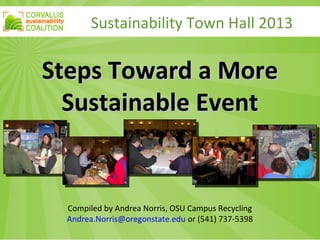Model sustainable event
- 1. Sustainability Town Hall 2013 Steps Toward a MoreSteps Toward a More Sustainable EventSustainable Event Compiled by Andrea Norris, OSU Campus Recycling Andrea.Norris@oregonstate.edu or (541) 737-5398
- 2. A Model Sustainable Event Waste Steps ŌĆó OSU Campus Recycling provided five recycling stations; local boy scout troop #163 volunteered to staff bins, helping attendees sort ŌĆó All trash cans removed from building (except in restrooms) ŌĆó Bathroom paper towels collected for composting ŌĆó Collected reusable paper during clean-up
- 3. A Model Sustainable Event Waste Steps ŌĆó Everything served by Valley Catering was compostable ŌĆó Exhibitors and attendees were asked to avoid bringing or distributing non-recyclable items ŌĆó Borrowed nametag holders from OSU University Events and returned for reuse
- 4. A Model Sustainable Event Energy Steps ŌĆó OSU Sustainability Office controlled lighting levels during the event to conserve energy ŌĆó Offsets provided by Pacific Power Blue Sky offset alloffset all electricity usedelectricity used (560 kWh) and will avoid 1,248 lbs of CO2, which is equivalent to not driving 1,265 miles1,265 miles or planting 15 trees15 trees.
- 5. A Model Sustainable Event Water Steps ŌĆó Bathroom faucet flow rates labeled so attendees could choose by efficiency ŌĆó Restrooms had only low flow toilets and urinals, and were labeled as such
- 6. A Model Sustainable Event Food Steps ŌĆó Menu from Valley Catering featured many Local 6 foods (from the counties touching and including Benton Co.). ŌĆō CheeseCheese from Full Circle Creamery, Scio ŌĆō CrackersCrackers from Oregon Cracker, Corvallis ŌĆō FlourFlour from Lonesome Whistle Farm, Eugene ŌĆō FruitFruit from Stahlbush Island Farms, Corvallis ŌĆō HummusHummus from De Casa, Eugene ŌĆō PotatoesPotatoes from Oven and Earth, Philomath ŌĆō SalsaSalsa from De Casa, Eugene ŌĆō Tofu PateTofu Pate from TobyŌĆÖs Tofu, Eugene ŌĆō Tortillas and ChipsTortillas and Chips from CarmenŌĆÖs, Eugene ŌĆō VegetablesVegetables from Stahlbush Island Farms, Corvallis ŌĆō Wild RiceWild Rice from Oregon Jewel, Brownsville
- 7. A Model Sustainable Event Food Steps ŌĆó Compostable serving ware from EcNow Tech ŌĆó Municipal tap water provided for beverage service (vs. bottled or shipped water) ŌĆó Signage used to identify local foods
- 8. A Model Sustainable Event Transportation Steps ŌĆó Marketing materials promoted alternative transportation ŌĆó Surveys used to determine modes of transportation used by attendees
- 9. A Model Sustainable Event Social Sustainability ŌĆó Marketing posters were made in English and SpanishEnglish and Spanish ŌĆó Educational signagesignage posted so attendees learned how to duplicate efforts
- 10. A Model Sustainable Event Economic Sustainability ŌĆó Purchased and promoted locallocal foodfood and serving wareserving ware ŌĆó Provided a venue to promote local businesseslocal businesses and organizations ŌĆó Local author and keynote speaker Rob Dietz spoke about his book, ŌĆ£Enough Is EnoughŌĆØ
- 11. Model Sustainable Events Other Resources ŌĆó OSU Green Event Guide ŌĆō recycle.oregonstate.edu ŌĆō Resources > Signage and Documents ŌĆó Other local organizations and events?
- 12. Model Sustainable Events Your Turn! Questions? Contact Andrea Norris, OSU Campus Recycling: Andrea.Norris@oregonstate.edu or (541) 737-5398 ŌĆó What are you working on? ŌĆó What have you seen others accomplish?











